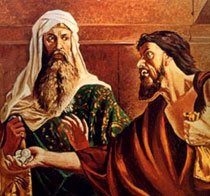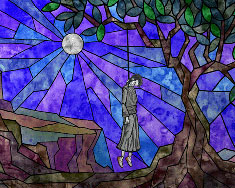
Judas,
the Ultimate Bad Guy
by Deborah Beach Giordano
Hand Washing
 While Pilate literally washes his hands in an effort to deny his part in Jesus’ condemnation, the religious authorities do as much metaphorically when Judas appears on their doorstep. Anxious and sorrowful, he holds the pieces of silver in his outstretched hands like a guilt offering: Can’t you please relieve me of this terrible burden?
While Pilate literally washes his hands in an effort to deny his part in Jesus’ condemnation, the religious authorities do as much metaphorically when Judas appears on their doorstep. Anxious and sorrowful, he holds the pieces of silver in his outstretched hands like a guilt offering: Can’t you please relieve me of this terrible burden?
Their response is to reject him: “That’s not our problem. Deal with it yourself.”
But it was their problem. The priests were the ones who had bribed the fellow to betray Jesus in the first place. And even if they had not done, wasn’t this suffering son of Abraham their responsibility? Surely the souls of all Israelites were their concern.
It wasn’t as if Judas was a hopeless case; there were systems in place to restore any who repented to the community. Depending on the sin it might take a good bit of time and effort, but the work could be accomplished through prayer, ritual, and offerings. God’s mercy was well known. Yet the priests offered him no comfort at all.
Why was Judas different?
Go Away
They can’t get rid of the guy fast enough. There is no discussion; the priests make no effort to engage with Judas as a human being who is in crisis — but hurriedly push him out the door.
His very presence makes them uncomfortable. Why would that be so?
What We See
 When we look at Judas we see a greedy, immoral fink. We aren’t sorry when the priests send him away; it looks to us like karma — as the betrayer is himself betrayed, the one who cast our Lord to the wolves finds himself cast out.
When we look at Judas we see a greedy, immoral fink. We aren’t sorry when the priests send him away; it looks to us like karma — as the betrayer is himself betrayed, the one who cast our Lord to the wolves finds himself cast out.
We feel this treatment is merited; he is Christ’s betrayer, after all. And so we tend to ignore — or even approve of — what Judas does next.
Abandoned, alone, bereft of hope, the Lord’s disciple takes his own life. It may appear an act of justice: “an eye for an eye,” but that cannot have been what Jesus wanted.
If he’d only had a bit more faith, if he’d only waited a few more days, Judas would have understood that all was not lost. If only he had truly believed in the Lord, Judas’ grief would have turned to joy. Even he would have been redeemed.
Exit the Stage
Instead, Judas is cast out. Exiled from the Lord’s community, and chased away from the temple, bearing his sins (and theirs) this man of guilt and shame is left to his own devices. He exits the stage, dying alone at the end of a rope and despised for eternity. The ultimate scapegoat.
Once Judas was gone, the priests must have sighed with relief. The witness to their perfidy could no longer testify. Their involvement in the capture and conviction of Jesus — the fact that his blood was on their hands — would remain a secret. No one could say for certain that they had done anything wrong.
That was surely the reason behind their unseemly rush to send Judas away: they wanted to rid themselves of the terrible reminder of their guilt.
The Absolute Worst
 Ah yes, Judas: the ultimate betrayer, the sell-out, the unfaithful disciple. The bad-un to top all others.… That man hanging from the tree bears a terrible burden indeed.
Ah yes, Judas: the ultimate betrayer, the sell-out, the unfaithful disciple. The bad-un to top all others.… That man hanging from the tree bears a terrible burden indeed.
How many fingers have pointed to him over the years? Look at Judas: now he was a real sinner, more corrupt and vile than anyone else who ever lived. Look at Judas, that terrible sinner!
By comparison I’m not bad at all!
Labeled as the great betrayer, cast out of the community, Judas carried the responsibility for all the evils that had been done. The religious authorities’ involvement in Jesus’ arrest, conviction, and crucifixion is somehow less significant. Peter’s repeated denials appear to be predictable lapses, that the rest of the disciples abandoned the Lord and left him alone and forsaken is treated almost as an aside. Even the fact that the Roman governor signed Jesus’ death warrant is blithely “washed away.” But Judas — boy, oh boy, now he’s the bad one.
By comparison, we’re not too bad at all.
Look There!
 Judas provided those around him with the perfect scapegoat. All of the bad things that happened were due to what he had done. Everything else — every scheme and plot, every failing and fault — was minor by comparison, readily justified and perfectly excusable. Judas was the one who was truly responsible, so everyone else could just sit back and relax.
Judas provided those around him with the perfect scapegoat. All of the bad things that happened were due to what he had done. Everything else — every scheme and plot, every failing and fault — was minor by comparison, readily justified and perfectly excusable. Judas was the one who was truly responsible, so everyone else could just sit back and relax.
That’s how it works with scapegoats.
They provide us with comforting lies that we ourselves fabricate: no matter what we’ve done or left undone, nothing is ever our fault. A scapegoat proves that there’s always somebody worse, there’s always another responsible party, there’s always someone else to blame.
A scapegoat gives us someone to point at, and thereby deflect attention away from ourselves.
Motes and Mirrors
How is it that you see the dust mote in your neighbor’s eye, but don’t notice the log in your own eye? How can you presume to say to your neighbor, ‘Let me take the speck out of your eye,’ while the log is obscuring your vision? Hypocrite! First remove the log from your own eye, and then you will see clearly.
~ Matthew 7:3-5
 Why is it that we think we see dust in others’ eyes while failing to note the I-beam blocking our own vision? For the same reason as we look for scapegoats and watch programs about hoarders. Because it’s easier, more convenient, and far less painful than dealing with our own stuff. Hey, there’s somebody who is worse — so I must not be so bad, after all. That person’s life is a bigger mess, so there’s no need for me to clean up my act.
Why is it that we think we see dust in others’ eyes while failing to note the I-beam blocking our own vision? For the same reason as we look for scapegoats and watch programs about hoarders. Because it’s easier, more convenient, and far less painful than dealing with our own stuff. Hey, there’s somebody who is worse — so I must not be so bad, after all. That person’s life is a bigger mess, so there’s no need for me to clean up my act.
That is why the priests were desperate to put some distance between Judas and themselves, so that when fingers were pointed, none would be aimed their way. That is why we need to be very careful when we are tempted to condemn others — for we often use their failings to disguise our own.
Virtual hugs and real-time blessings,
Deborah †
Suggested Spiritual Exercise
What failings and faults do you notice in others? How do these relate to your own?